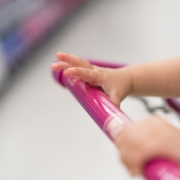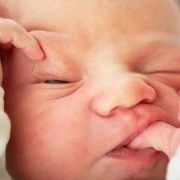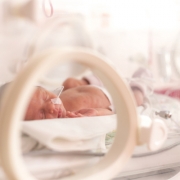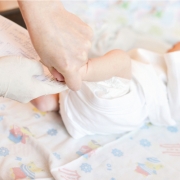
In order to grow, the body must release growth hormone. The brain releases growth hormone during sleep. Your baby will double in size and weight in the first 2-3 months. Therefore, for the first month your baby will sleep the majority of the day. Read More: HealthyChildren.org

Newborn and infant skin is very sensitive, and rashes are common. Normal rashes include: Heat rash—a fine red rash mostly seen on the upper chest and diaper area. Avoid over wrapping your baby and use fragrance-free lotion if the skin is dry. Erythema Toxicum—red blotches with tiny white bumps in the center. It appears a … Continue reading “Skin”

Shopping with your baby can be a challenging experience. Serious injuries are quite common from shopping carts. Place the baby carrier in the deep basket of the shopping cart, recruit an older sibling to help supervise your baby if they must be in the shopping cart, or leave your baby at home when possible. Read … Continue reading “Shopping Carts”

Babies are born with reflexes that influence much of their behavior over the first few months. Some of these include sucking, turning the head toward your hand if you stroke her cheek or mouth, and the grasp reflex in which stroking your baby’s palm or underside of their foot will cause them to curl their … Continue reading “Reflexes, Hiccups, & Infant Behavior”

Product recalls are meant to keep dangerous products off the shelves. Parents often encounter difficulty remaining aware of product recalls. Consider some easy tips to help ensure your family stays safe such as signing up for email notices to notify you when a product is recalled or visiting websites that maintain up to date information … Continue reading “Product Recalls”

Always put your baby to sleep on his back and on a firm sleep surface. Keep soft objects, loose bedding, or any other objects that could increase the risk of entrapment, suffocation, or strangulation out of the crib. Place your baby to sleep in the same room with you but not the same bed. Your … Continue reading “Preventing SIDS – Sleep Positioning”

Avoid large crowds and be careful in public places for the first 2 months of life. Good hand washing before and after handling your baby is one of the most important things you can do to prevent infection. You should always have hand sanitizer available. Anyone caring for your baby should be up to date … Continue reading “Preventing Illness in Newborns”

Your baby may have been born earlier than expected. It’s normal to have a lot of questions, feel stress and to be worried. Premature babies require extra medical care and support that is often given in a neonatal intensive care unit (NICU). As a parent to a premature baby, there are resources available to you … Continue reading “Premature Infants”

It is normal to have emotional ups and downs after delivering a baby. For some mothers, the experience of pregnancy and childbirth is followed by significant sadness, anxiety, difficult sleeping and difficulty making decisions. A depressed or anxious mother may not be able to provide the nurturing that her baby needs to grow and thrive—putting … Continue reading “Postpartum Depression”

Before your child leaves the hospital, testing will be performed for inherited diseases, hearing loss, jaundice, critical heart defects, etc. Screening for and treating these conditions shortly after birth helps ensure the best outcome for your baby. If there are abnormal results, your pediatrician will discuss this with you. Read More: health.utah.gov